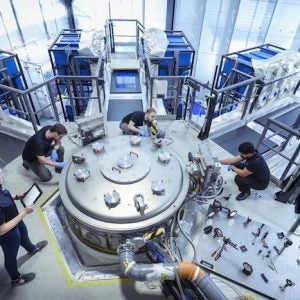Swiss NPP operators face lower or possibly no contributions to the decommissioning and waste disposal funds for the period 2017-2021, because of the 10-year delay of in commissioning a deep geological repository, World Nuclear News reported. Switzerland has two central funds, one for decommissioning its five nuclear power reactors, and another for disposal the wastes. Operators are charged set fees each year to ensure there are sufficient funds to cover these tasks after a 50-year lifespan – an arbitrary time period selected by the cabinet in May 2011.
The predicted costs of decommissioning and waste disposal are reviewed every five years. The Administrative Commission of the Decommissioning Waste Disposal Fund (STENFO) manages the funds and takes the key decisions. The latest review was in 2011.
The Swiss Federal Energy Office announced on 15 December that the national nuclear trade organisation Swissnuclear has submitted the latest cost study for decommissioning and waste disposal to STENFO, based on which the STENFO Administrative Commission has set operators’ provisional contributions for the 2017-2021 assessment period.
Power company Axpo said its provisional contributions set for the 2017-2021 period for the Beznau NPP are "significantly lower" than in the previous period. The latest cost study puts the total cost for decommissioning and waste disposal at the two-unit plant at CHF5.62bn ($5.45bn), up 6.4% from the previous study. However, the company said it will not have to make an annual contribution over the coming period "due to the fact that the geological deep repositories are to be put into operation at a later stage and also because of the good fund performance of the past years". It said to date it has paid CHF91.2m a year for the Beznau plant.
BKW – operator of the Mühleberg plant – said the latest cost study puts the estimated costs of decommissioning and waste disposal at the plant at CHF3.06bn, some 9.4% more than the 2011 cost study. The increase is mainly due to "careful project planning and the higher risk allowances, plus changes and delays in the planning of the deep geological repository for radioactive waste disposal". However, BKW noted that since financing for the decommissioning of Mühleberg has already been secured in full, the company will not need to contribute to the decommissioning fund after 2017 but will continue to contribute about CHF18m a year to the waste disposal fund.
Kernkraftwerk Gösgen said its provisional annual contributions to the decommissioning and disposal funds for the Gösgen NPP have been set at CHF9.6m and CHF11.0m respectively, which is lower than before because of the delayed commissioning of a repository. Kernkraftwerk Leibstadt said its contributions have been set at CHF9m for the decommissioning fund and CHF22m for the waste fund compared with previous payments to the funds totalling CHF63. According to the latest cost study, some CHF7.22bn will be required for decommissioning and waste disposal at the Leibstadt plant.
The scientific and technical aspects of the 2016 cost study will be examined by the Swiss Federal Nuclear Safety Inspectorate, which is expected to give its opinion by the end of 2017. A panel of independent cost experts will also review the study on behalf of STENFO. During 2018, Switzerland’s Department of the Environment, Transport, Energy and Communication will fix the amount of decommissioning and disposal costs at the request of the Administrative Commission. The next cost estimation will be made in 2021 for the 2022-2026 period.






